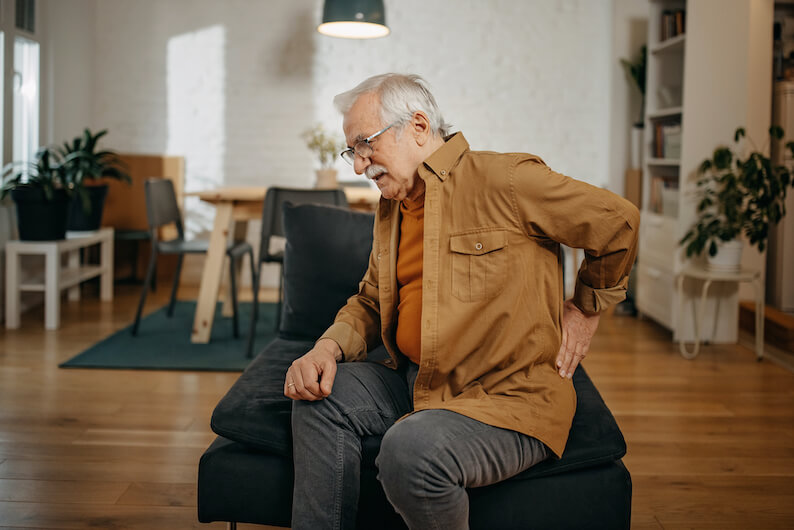What Are Kidney Stones?
A kidney stone is a hard object made out of minerals and acid salts that crystalize and stick together in concentrated urine. These mineral deposits can form in your kidneys or anywhere along your urinary tract, including your bladder, urethra, or ureter.
The size and type of kidney stone can vary and determines the severity of the condition. Smaller kidney stones in older adults can usually pass through the urinary tract with minor pain, while larger stones can be quite painful and even result in the need for medical intervention.
Types of Kidney Stones
There are four main types of kidney stones.
Calcium stones – Also known as oxalate and phosphate stones, calcium kidney stones are the most common form, making up 80 percent of cases. These types of stones form when the concentration of calcium in the urine becomes too high.
Uric acid stones – These are the second most common type of kidney stone and occur when acidic levels are too high in the urine. Uric acid stones are typically associated with diseases like gout, diabetes, obesity, and metabolic conditions.
Struvite stones – These stones are composed of ammonium, magnesium, and phosphate salts and occur when urine becomes too alkaline or not acidic enough. These types of kidney stones aren’t as common and usually develop in people who experience frequent urinary tract infections.
Cystine stones – The rarest type of kidney stone, cystine stones develop from excess cystine, an amino acid that makes up protein and naturally occurs in the body.
Kidney Stones Symptoms
Usually, one of the first signs of a forming kidney stone is pain in your mid-back or side. A kidney stone in older adults may not produce any symptoms until it begins to pass into one of the ureters. The ureters are the tubes that connect the kidneys and bladder. If a kidney stone gets lodged in one of the ureters, it could block the flow of urine, resulting in your kidney beginning to swell. This can cause the ureter to spasm. Kidney stone pain can come and go in waves and fluctuate in intensity. Many who pass kidney stones find it very difficult to find a comfortable position.
Kidney stone symptoms can include:
- Intense pain in the lower abdomen, back or side, and/or the groin
- Nausea or vomiting
- Fever and chills
- Pain or burning sensation while urinating
- Pink, red, or brown urine
- Cloudy or foul-smelling urine
- Persistent need to urinate
If you’re experiencing any of these symptoms, contact your local VIPcare provider immediately!
Kidney Stone Treatment
Most kidney stones pass on their own within a couple of weeks. However, it can range from days to a matter of weeks, depending on the size and location.
The ideal situation is to pass stones naturally by drinking 6-8 glasses of water a day and managing pain with over-the-counter pain relievers. In some cases, your provider may prescribe an antibiotic if an infection is present, as well as pain medication if extreme pain persists.
If you’re unable to pass the kidney stone naturally, you may require medical assistance. These forms of treatment include lithotripsy and ureteroscopy.
Lithotripsy is a procedure that uses shockwaves to help break up the kidney stone so it can pass through the urinary tract. Ureteroscopy involves using a ureteroscope (a tiny camera attached to a wire) that is inserted into the bladder through the urethra. The kidney stone is located and then removed via a small cage on the end of the ureteroscope.
Kidney Stone Prevention in Older Adults
Your lifestyle plays a significant role in the prevention of kidney stones. Making positive lifestyle changes can lower your risk of developing a kidney stone.
Stay properly hydrated – Drinking plenty of water prevents dehydration, a common factor in the formation of kidney stones. The goal is to keep your urine as diluted as possible. Your urine should be pale in color, indicating you are drinking enough fluids.
Reduce salt intake and animal protein – High-sodium foods and diets can help create kidney stones, while animal protein can also increase your levels of uric acid. Reduce your salt and choose nonanimal protein sources, such as legumes.
Eat calcium-rich foods – Sounds counterintuitive, but getting enough calcium from foods can help prevent kidney stones by binding with oxalate before reaching the kidneys. You should talk to your provider about your calcium intake, especially if you suffer from heart or kidney disease.
Limit oxalate-rich foods – If you tend to form calcium oxalate stones, you may need to eat fewer foods rich in oxalates. These include rhubarb, beets, okra, spinach, Swiss chard, sweet potatoes, nuts, tea, chocolate, black pepper, and soy products.
You can take measures to potentially lower your risk of preventing kidney stones. However, gender, underlying medical conditions, and genetics can play a role in the development and frequency of kidney stones in older adults. You should discuss your risk with your provider and develop a prevention plan that will help keep kidney stones at bay.




